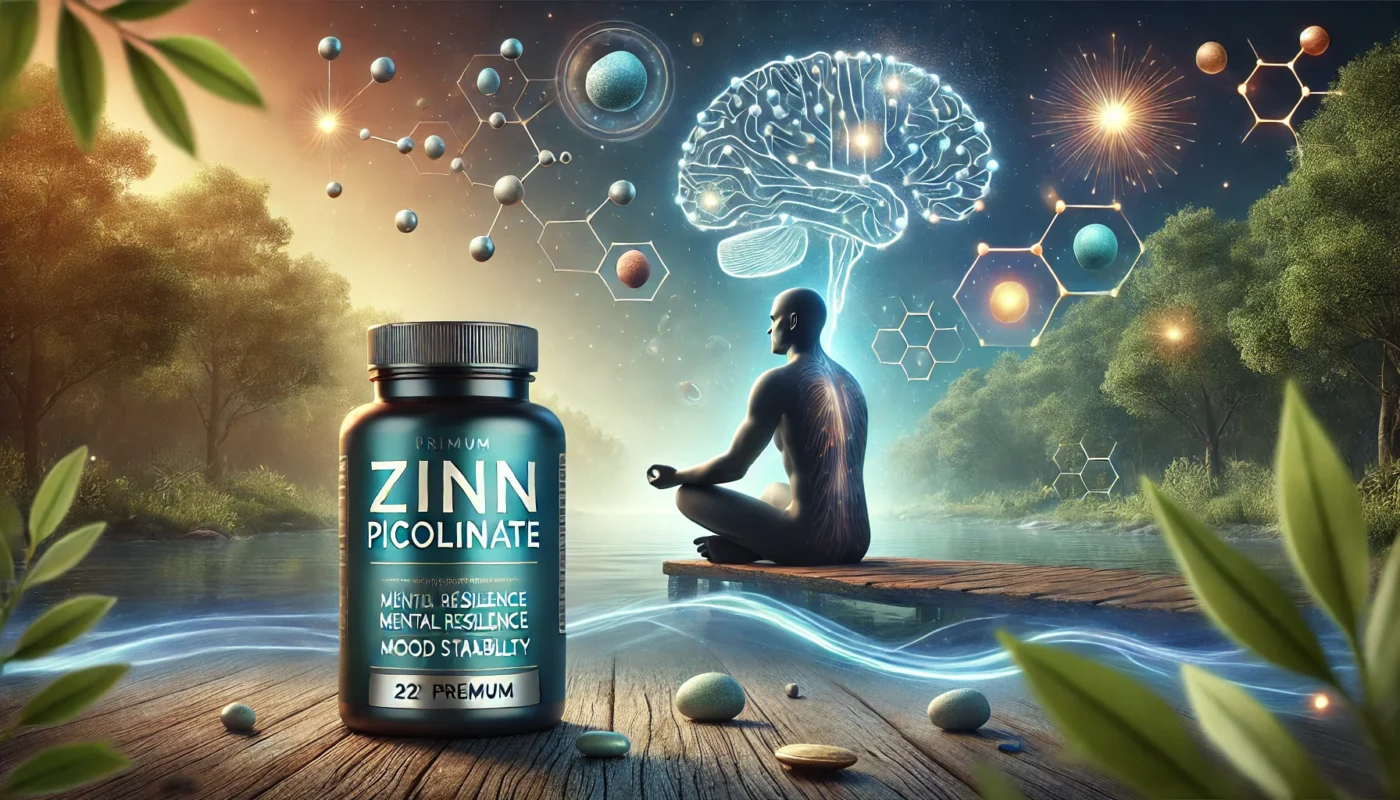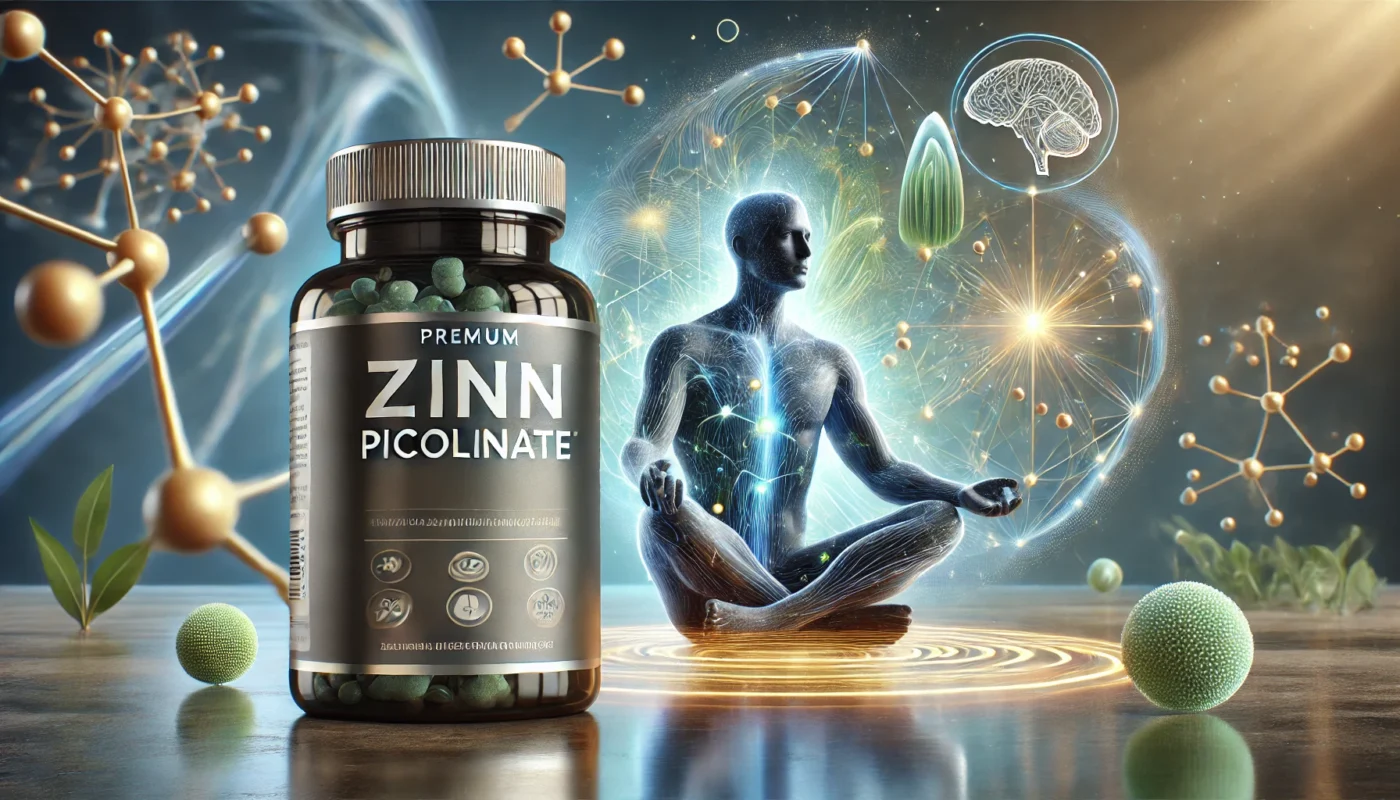Mental resilience—the ability to navigate stress and maintain emotional stability—is a cornerstone of psychological well-being. However, modern lifestyles marked by chronic stress, poor diets, and environmental toxins often strain this capacity. Emerging research highlights zinc, an essential mineral, as a vital component in maintaining emotional balance and enhancing mental resilience. Specifically, zinc picolinate, known for its superior bioavailability, has gained attention for its potential to regulate neurotransmitter function and support mood stability.
This article delves into the role of zinc picolinate in fostering mental resilience, backed by scientific evidence and clinical insights.
You May Also Like:
Zinc Picolinate and Memory Retention: Enhancing Brain Power
Zinc Picolinate for Healthy Aging: Fighting Oxidative Stress
Zinc Picolinate for Mental Resilience: Supporting Mood Stability is an original (HSLHealing) article.
Zinc’s Role in Brain Chemistry
Zinc is a trace mineral that plays a critical role in brain function. It is involved in numerous physiological processes that influence mental health, including:
- Neurotransmitter Regulation: Zinc modulates the synthesis and function of key neurotransmitters like serotonin, dopamine, and gamma-aminobutyric acid (GABA), which govern mood, motivation, and emotional regulation.
- Neuroplasticity: Zinc supports synaptic plasticity—the brain’s ability to adapt and rewire in response to experiences, learning, and stress.
- Stress Response: Zinc influences the hypothalamic-pituitary-adrenal (HPA) axis, which regulates the body’s stress response. Deficiency can result in an overactive HPA axis, contributing to anxiety and mood disorders.
What Is Zinc Picolinate?
Zinc picolinate is a chelated form of zinc, where the mineral is bound to picolinic acid, a naturally occurring organic compound. This binding improves zinc’s absorption and bioavailability, making it one of the most effective forms for supplementation. For individuals seeking to optimize zinc intake, particularly for mood-related benefits, zinc picolinate offers a reliable solution.
Support mood stability with premium zinc picolinate—shop top-rated supplements on Amazon today!

The Link Between Zinc Deficiency and Mood Disorders
A growing body of research has established a connection between zinc deficiency and mood disorders such as depression and anxiety. Studies reveal that individuals with these conditions often exhibit lower serum zinc levels compared to healthy controls. According to the World Health Organization, up to 20% of the global population is at risk for zinc deficiency, with higher prevalence rates in developing nations and among specific groups, such as the elderly and pregnant women.
Key Mechanisms by Which Zinc Deficiency Impacts Mood:
- Impaired Neurotransmitter Function: Zinc is essential for the production of serotonin and dopamine. Deficiency can disrupt the balance of these neurotransmitters, leading to mood instability.
- Elevated Inflammation: Zinc deficiency has been linked to increased levels of inflammatory cytokines, which are associated with depression and anxiety.
- Oxidative Stress: Zinc supports the activity of antioxidant enzymes like superoxide dismutase (SOD). Without sufficient zinc, oxidative stress can damage neural pathways critical for emotional regulation.
How Zinc Picolinate Supports Mood Stability
Zinc picolinate addresses the underlying mechanisms contributing to mood disorders and fosters emotional resilience through the following pathways:
- Regulating Neurotransmitters:
Zinc enhances the activity of neurotransmitters such as serotonin and GABA, which promote relaxation and emotional balance. A study in Progress in Neuro-Psychopharmacology & Biological Psychiatry found that zinc supplementation improved serotonin receptor function in animal models of depression. - Reducing Inflammation:
Chronic inflammation is a hallmark of mood disorders. Zinc modulates the immune system, reducing levels of pro-inflammatory cytokines. Clinical trials published in Nutrients demonstrate that zinc supplementation decreases inflammation markers in individuals with depression. - Alleviating Stress Response:
Zinc plays a critical role in regulating the HPA axis. Research in Biological Psychiatry highlights that zinc supplementation reduces cortisol levels, the stress hormone often elevated in anxiety and depression. - Supporting Antioxidant Defense:
Zinc’s role as an antioxidant helps protect neurons from damage caused by oxidative stress. This is particularly important for individuals experiencing chronic stress, as oxidative stress exacerbates mood instability.

Clinical Evidence Supporting Zinc for Mood Stability
- Zinc and Depression (2013):
A meta-analysis in Biological Psychiatry reviewed 17 studies investigating the relationship between zinc levels and depression. The analysis revealed that individuals with depression consistently had lower zinc levels, and supplementation significantly reduced symptoms, particularly when combined with antidepressants. - Zinc Supplementation in Women (2017):
A randomized controlled trial published in Nutrition Research examined the effects of zinc supplementation on mood in young women. Participants taking 25 mg of zinc daily for 10 weeks reported significant reductions in anger, hostility, and depressive symptoms compared to the placebo group. - Zinc and Anxiety (2011):
A study in Journal of Affective Disorders evaluated the impact of zinc supplementation on individuals with anxiety disorders. Results showed improved mood stability and reduced anxiety symptoms after 8 weeks of zinc supplementation. - Postpartum Depression (2015):
Research in BMC Psychiatry investigated the role of zinc in preventing postpartum depression. Women receiving zinc supplementation during pregnancy experienced fewer mood disturbances in the postpartum period, highlighting zinc’s potential for maintaining emotional resilience during hormonal transitions.
Recommended Dosage and Safety
The recommended dietary allowance (RDA) for zinc is:
- Adult men: 11 mg/day
- Adult women: 8 mg/day
- Pregnant women: 11 mg/day
- Lactating women: 12 mg/day
Clinical studies exploring zinc’s role in mood stability often use therapeutic doses ranging from 25–40 mg per day. However, excessive zinc intake (above 40 mg per day) can lead to side effects, including nausea, reduced copper absorption, and gastrointestinal discomfort. Always consult a healthcare provider before starting supplementation, especially for individuals on medication or with pre-existing health conditions.
Dietary Sources of Zinc
While zinc picolinate is an effective supplemental option, dietary intake remains an important foundation for achieving adequate zinc levels. Foods rich in zinc include:
- Shellfish (e.g., oysters, crab, and shrimp)
- Red meat and poultry
- Legumes (e.g., chickpeas, lentils, and beans)
- Seeds (e.g., pumpkin seeds, sunflower seeds)
- Nuts (e.g., cashews, almonds)
For individuals with absorption challenges or higher zinc requirements, such as those with chronic illnesses or stress, zinc picolinate can help bridge the gap.

Zinc Picolinate in a Holistic Approach to Mental Resilience
Zinc picolinate is most effective when combined with other strategies to enhance mental resilience and emotional balance. These include:
- Balanced Nutrition:
A diet rich in omega-3 fatty acids, B vitamins, and magnesium can complement zinc supplementation to support brain health. - Regular Physical Activity:
Exercise boosts endorphin levels, reduces cortisol, and promotes neuroplasticity, all of which enhance mood stability. - Stress Management Techniques:
Practices such as mindfulness meditation, deep breathing, and yoga can regulate the HPA axis and improve emotional regulation. - Adequate Sleep:
Sleep is critical for emotional resilience. Zinc has been shown to improve sleep quality by influencing melatonin production. - Social Support:
Maintaining strong social connections is vital for mental health and resilience.
Future Research Directions
While current evidence supports zinc’s role in mood regulation, more research is needed to fully understand its potential in diverse populations. Key areas for future investigation include:
- Long-term effects of zinc supplementation on mood disorders
- Synergistic effects of zinc with other nutrients or medications
- Genetic factors influencing individual responses to zinc supplementation
Conclusion: Zinc Picolinate as a Tool for Mood Stability
Zinc picolinate offers a science-backed approach to enhancing mental resilience and supporting mood stability. By regulating neurotransmitter function, reducing inflammation, and combating oxidative stress, zinc picolinate addresses the underlying mechanisms of mood disorders and fosters emotional balance. While not a standalone solution, it can be an invaluable part of a comprehensive strategy for mental well-being.
For individuals struggling with mood instability or chronic stress, consulting a healthcare provider to assess zinc levels and determine the suitability of zinc picolinate supplementation is a crucial first step. With the right approach, zinc picolinate can be a powerful ally in the journey toward emotional resilience and psychological health.

References
- Zinc in the Monoaminergic Theory of Depression: Its Relationship to Neural Plasticity. Retrieved from: https://pmc.ncbi.nlm.nih.gov/articles/PMC5337390/
- The role of zinc in neurodegenerative inflammatory pathways in depression. Retrieved from: https://pubmed.ncbi.nlm.nih.gov/20156515/
- Zinc in depression: a meta-analysis. Retrieved from: https://pubmed.ncbi.nlm.nih.gov/37364014/
- A systematic review of the association between zinc and anxiety. Retrieved from: https://pubmed.ncbi.nlm.nih.gov/37364014/
- The effect of zinc supplementation on mental health in overweight/obese patients with non-alcoholic fatty liver disease: A randomized, double-blind, placebo-controlled trial. Retrieved from: https://www.sciencedirect.com/science/article/pii/S2773050622000349
Important Note: The information contained in this article is for general informational purposes only, and should not be construed as health or medical advice, nor is it intended to diagnose, prevent, treat, or cure any disease or health condition. Before embarking on any diet, fitness regimen, or program of nutritional supplementation, it is advisable to consult your healthcare professional in order to determine its safety and probable efficacy in terms of your individual state of health.
Regarding Nutritional Supplements Or Other Non-Prescription Health Products: If any nutritional supplements or other non-prescription health products are mentioned in the foregoing article, any claims or statements made about them have not been evaluated by the U.S. Food and Drug Administration, and such nutritional supplements or other health products are not intended to diagnose, treat, cure, or prevent any disease.

